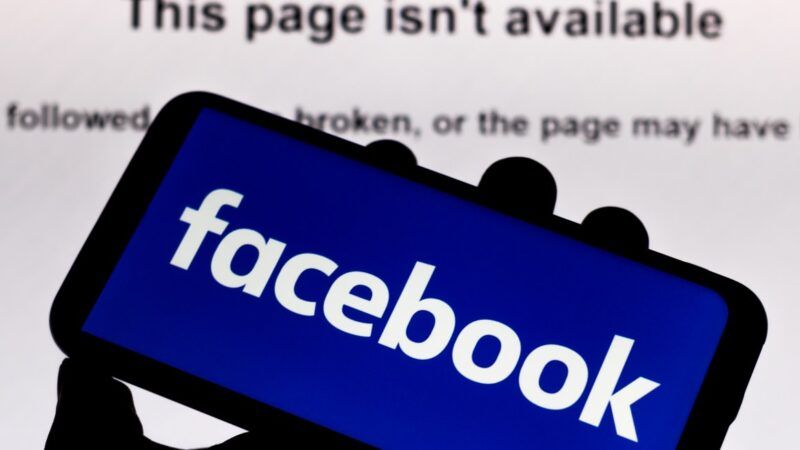What Will 303 Creative Mean for Social Media Regulation?
If you can't force a web designer to serve a gay wedding, can you force a web platform to serve a politician?

When the conservative majority in the Supreme Court ruled Friday in 303 Creative v. Elenis that a Colorado website designer cannot be forced to create webpages to celebrate gay marriages, most if not all coverage by the mainstream press centered on what the ruling meant for LGBT folks.
A CNN headline says the ruling "limits LGBTQ protections," which is an extremely narrow way of evaluating the ruling. Early after the ruling, the LGBT magazine Out tweeted that the ruling allowed businesses to refuse to serve LGBT people, which is absolutely wrong. It deleted that tweet and replaced it with a new one with the slightly more accurate explanation that the ruling restricts "the ability to enforce anti-discrimination laws." Then on Saturday, Out tweeted a link to its coverage that incorrectly claimed that the ruling means "a business can refuse to serve someone simply because they are LGBTQ+."
The majority decision makes it abundantly clear that this case is about free speech. Graphic designer Lorie Smith of 303 Creative cannot refuse to serve LGBT people under Colorado's anti-discrimination law, and all nine Supreme Court justices agree that Colorado has the authority to implement such a law. But the First Amendment and many Supreme Court precedents do not allow any government entity to force people to communicate any message they find offensive or that they don't agree with.
Rather than bemoaning that a very small number of businesses will have the right to decline service to gay weddings—the many competitors in this extremely saturated commercial field will happily pick up the slack—consider how this ruling helps reinforce every business's liberty to decline to platform speech they disagree with or find offensive. And that includes social media platforms like Facebook, Twitter, YouTube, and others.
I joked on Twitter not long after the ruling Friday that the big loser of the decision was actually Florida Gov. Ron DeSantis, who signed and supports a law in his state that forces social media platforms to carry messages from candidates running for office within the state and threatens massive fines to qualifying platforms that refuse. The law's implementation was blocked a year ago by a panel of federal judges who ruled that "if social-media platforms currently possess the First Amendment right to exercise editorial judgment, as we hold it is substantially likely they do, then any law infringing that right—even one bearing the terminology of 'common carri[age]'—should be assessed under the same standards that apply to other laws burdening First-Amendment-protected activity."
In that Florida ruling, the judges decided that platforms have the right under the First Amendment to exclude political messages they find offensive.
The same logic is driving the Republican leaders in Florida, the liberal political regulators in Colorado, and even the American Civil Liberties Union: They each attempt to argue that certain businesses are merely providers of services. It shouldn't matter to them what content they're handed. They should just do the job. Bake the cake. Print the shirt. Post the statement.
They are wrong. Just as Smith shouldn't be required to design a gay wedding page, Elon Musk over at Twitter shouldn't be required to host political speech from anybody he deems offensive.
Now, whether that's what the Supreme Court would rule if a case regarding social media platforms or censorship makes its way in front of the justices is another question. Justice Neil Gorsuch, delivering the majority opinion in 303 Creative, tailored the decision around Smith's role as a creative content producer for a client. He worries specifically about "the government [forcing] all manner of artists, speechwriters, and others whose services involve speech to speak what they do not believe on pain of penalty."
It's easy to imagine an argument against social media platforms falling under that umbrella. Some Republicans like DeSantis attempt to claim that social media platforms are "common carriers" like public utilities and phone services, thus making it legal to order them to host certain types of content, even if it's against their own standards or wishes. That is the argument that Florida used (unsuccessfully in this case) to defend its law.
In Texas, a similar law that attempts to force social media platforms to host content, again supported by conservatives and Republican Gov. Greg Abbott, was upheld by the 5th Circuit Court but then put on hold by the Supreme Court while the case weaves through the system. At that time, Justice Samuel Alito, joined by Justices Gorsuch and Clarence Thomas, wrote a dissent to allow the law to take effect during this dispute, observing, "It is not at all obvious how our existing precedents, which predate the age of the internet, should apply to large social media companies."
The 303 Creative decision is silent about its broader potential implications for the online world, but that silence is itself a choice.
Gorsuch took great pains to make it clear that the Court is not giving permission to Colorado businesses to turn away LGBT customers. But the ruling does not take a moment or even a footnote to say that the speech of "large social media companies" is somehow different from 303 Creative's speech. And rightly so.
The same justices who seem to think it might be OK to force social media platforms to host speech they don't like should read over their own decision in 303 Creative.


Show Comments (35)